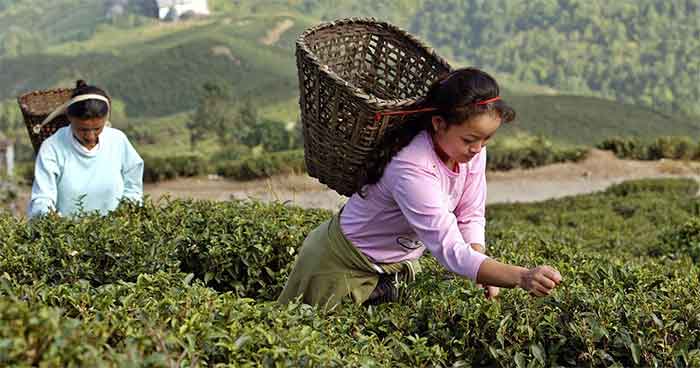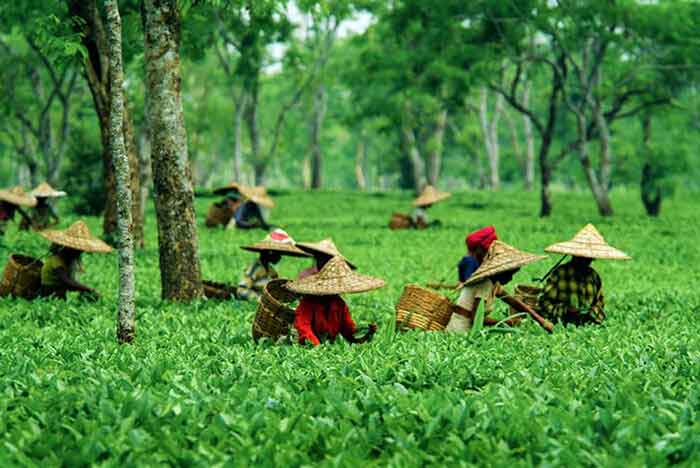An exclusive interview with Sandip C Jain about Darjeeling and its tea industry

Darjeeling tea is known worldwide for its delicate taste and for being one of the most expensive teas. Despite this, when we look at the tea laborers we find how little their condition has changed over time. They still have to protest for days to increase a few rupees in their wages. Although there is still rising demand for Darjeeling tea in the foreign market, its tea industry still fails to provide the desired lifestyle to its laborers. Sandip C Jain who himself is a journalist and the editor of Himalayan Times have closely witnessed Darjeeling tea industry over many years. This interview with him throws light on the present scenario as well as the expected fate of Darjeeling and its tea industry in future.
Could you describe something about yourself like from where do you belong and your work experience?
I belong to Kalimpong which was formerly a part of Darjeeling district and now it is a district itself. I am basically a writer and a journalist. I am the editor of the newspaper named Himalayan Times and I write for most of the English publications across the region as well as nationally.
Talking about Darjeeling, it produces one of the finest teas in the world but today it is facing many problems. As a journalist, what according to you are the major problems?
There are several. Firstly, Land policy of the government of West Bengal, which doesn’t let these tea garden owners to use the land in a more profitable way so as to sustain further economic activities. Earlier huge tracts of land used by tea gardners for planting trees became unsustainable because of the huge cost on tea production and laborers. They wanted to use the land for further development and economic activities, which the government doesn’t allow.
Secondly, the labor problem here is quite immense due to political disturbances leading to strikes and lockdowns as well as socio-economic conditions of the region. All this contributed to lowering down of the production in the gardens due to which owners lost their interest in developing their business. Thereafter, gardens have changed so much that no longer do we have tea garden owners who are there for the love of tea. Most of them now are only profit oriented and owned by people from Kolkata and rest of the plains, who absolutely have no love for the tea or the place. When these owners saw that production had gone down, they, I think, started investing less in the gardens. So, along with productivity, quality also decreased.
Thirdly, more than 150 year old tea bushes and non-existent re-plantation of tea shrubs further led to the deterioration of the quality of the tea produced.
As you said, Darjeeling is facing a huge laborers shortage as the owners can’t keep them in delusion about the kind of lifestyle that others are pursuing. They have T.V and mobile phones which have made them more aware about the rest of the world and the kind of life others live. Hence, they don’t want their own children to work on tea gardens. Do you think the tea industry is going to decline very much in the next 20-30 years because of this?
I feel that you are correct in this way. None of the tea gardner’s laborers in the previous generation wanted their children to come back as tea laborers. Due to missionary schools and a better education system, their children have studied much better than their parents and have started moving out of the tea garden. That is the reason why there is no new influx of good labor in the tea garden. Most of the laborers working today are getting old and productivity is decreasing. Because of the miserable condition in which they have to live, none of them want their children to come back.
The tea garden politics or labor politics have gone to such an extent that even the tea garden owners are not interested in increasing productivity and are more interested in getting hold of the land. One of the important reasons for the decline of the tea industry was the political agitation because of which the production, distribution and sale of the darjeeling tea has become very unpredictable. Hence, national and international buyers can’t always depend upon darjeeling for tea. They need to find new sources of tea production and look elsewhere. Today Darjeeling tea is growing in Kenya, Sri lanka and so many other places. So, the buyers don’t actually have to rely on Darjeeling for drinking darjeeling tea.
You mentioned the word ‘Tea Garden Politics’, could you please elaborate on this?
In the last four decades, the population in the tea garden has grown quite a lot in the hills. The main political leaders who started coming out of the darjeeling hills were originally tea garden leaders and then they became leaders of the hills as such. So they needed to keep their core constituency happy. The muscle power or their core supporters, you can say, all of them came from tea gardens, which was a very easy thing to do because firstly, tea laborers weren’t very educated and raw kind of people. These leaders found it very easy to exploit them. These laborers started demanding much more than what the owners could actually give. Earlier, owners also were eager to do a lot more which they haven’t been doing. But in the last four decades, the general population of tea laborers were empowered by these political leaders…..this I feel is again one of the reasons for the decline of darjeeling tea production.
Another thing is the rampant use of chemicals like fertilizers used by the owners. Earlier it was more organic. Over time definitely the quality and production will go down because of the use of chemicals.
Darjeeling tea gardens started shifting from conventional farming to organic farming from the late 1980s and that is one of the reasons for its fame in the international market. But you said that fertilizers are still being used, what do you have to say about it?
Actually fertilizers are still used. Hathi ke dant khane ke aur dikhane ke aur ( The visible teeth i.e tusks and the teeth used by an elephant to eat are not the same) The market and brand value for organic tea world wide is larger than chemically grown tea. Many of these tea gardens say they are organic but dikhane wala dant zayada hai (it is more like tusks of an elephant). Bulk of their farming still uses chemical substances
You mentioned that tea estates in Darjeeling are owned by profit oriented Bengalis and Marwaris. But many of these gardens are loss making and even if they make profits, it is marginal. So how are they actually making profit while it is expected that in the next few decades the tea industry is going to decline in Darjeeling?
Like I earlier said, these industrialists are more interested in the value of land than the tea production itself. There are tea gardens which are hundreds of acres. So what the tea garden owners earn per year by selling tea is peanuts as compared to its land value. Suppose the land value is 100 crores and the owner earns peanuts from tea production which is not their headache. But the real profit comes after a decade, when they sell the land for 200 crores. These people are basically more interested in land valuation than in the tea garden production or profits from selling tea.
Darjeeling is facing major competition from Nepal as it is producing similar quality tea at a low cost. Do you think workers in Nepal are also facing similar problems as in Darjeeling and if so, why aren’t they protesting and why Nepal is not facing shortage of laborers as in Darjeeling?
There are two reasons. Firstly, the political situation. In the last four decades the tea garden laborers have been politicized so much by political leaders that their mental framework has completely differed from any other neighbors even in the hills. I think laborers in Nepal are still very work oriented. I am not saying Darjeeling laborers are totally kamchor (lazy). I also think the productivity in Nepal tea gardens is much better than here.
Secondly, I think it also depends upon the overall economic development of the country. India has progressed quite a bit in the last four decades. The children are finding better economic opportunities outside tea gardens. Hence they are venturing out for better opportunities. While laborers in Nepal still think that they will not have a better and sustainable lifestyle outside the tea garden and that is why I think they are still sticking to the tea garden rather than venturing out.
After the pandemic, what all the tea industry in Darjeeling had to suffer?
The situation is the same whether it be before or after the pandemic. All issues were the same as were faced before and after. But yes, after the pandemic, the world market declined and naturally, demand for darjeeling tea also declined across the world, so the owners started paying less to the laborers. I think the core issues are the same. But due to the declining national and international market, the revenue has definitely gone down which will affect both the tea gardens as well as the quality of tea that is being produced.
My last question is, what do you think about the Gorkhaland movement? Do you support it or not and what are the reasons for it?
Yes, I may not support the name ‘Gorkhaland’ as Darjeeling hills don’t belong to the Gorkhas only because many other communities also live there. But I used to believe that the political, developmental and socio-economic disturbances would decrease with the creation of a new state but I used to think this way several years back. I still firmly believe that people here are very different from the plains of West Bengal and they should have a separate administrative set up or state of their own. But the fact again goes back to the tea garden because the quality of leadership in the Gorkhaland movement is not the quality that would take the hills to greater heights. So I firmly believe now that we must start creating better leadership if we want to have a state. If we have the same leadership that we had from the last four decades and if the government of India actually gives us a state today, then we are looking at bad times.
Earlier, I was very much involved in the statehood movement and I still believe a different administrative set up or state for Darjeeling would ultimately be better not only for people here but for the entire West Bengal and for the entire country.
Sandip C Jain is a journalist and the editor of Himalayan Times. Pragya Ranjan is a young writer and a critic.









































